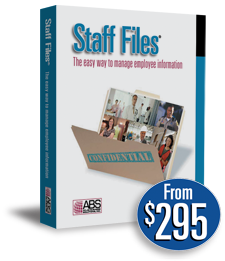
Human Resources Software
Staff Files 8.0 is the easiest way to manage employee information including time-off accruals, training records, and performance reviews.
Managing Employee Files in HRIS When Firing Employees
Firing employees can be stressful and risky. When terminating employees, you risk possible lawsuits, as well as adding stress to your existing workforce. One way to avoid both of these situations is to have a progressive discipline policy in place. This policy should be clearly written and communicated to your personnel. It’s common to include a progressive discipline policy in an employee handbook. It’s also important for this policy, and any other company policies, to be enforced consistently and fairly among your entire staff.
Categories
Popular Tags
- upgrade
- Appointment Scheduling
- Employee Scheduling
- personnel records
- customer review
- reports
- how to schedule
- write a business plan
- Human Resources
- Business Planning
Lawsuits an employee could file after being terminated include retaliation, wrongful termination, discrimination, and unlawful harassment. A couple of examples of a retaliation suit are employees who have been terminated after whistle blowing or filing a previous claim. An employer should be especially mindful when firing an employee who qualifies as a protected class.
Stress, anxiety, gossip, and confusion all can wreck havoc on a workforce’s attitude and productivity. When your personnel view a termination of a coworker as questionable, they become nervous and start second-guessing the expectations their managers have for their job performance. The fear of possible termination can become overwhelming and paralyzing to your existing staff.
An easy way to avoid these two situations is to document performance and disciplinary issues. It’s helpful for each employee to have a clearly written job description, so they know exactly what is expected of them. You should also use the job description to conduct performance reviews each year. Documenting a problem with the employee’s performance will help your case if you later terminate the employee and, in the meantime, it will give the employee a chance to correct the issue. A progressive discipline policy means there are at least a couple of steps, or warnings, before an employee is fired. Each discipline warning should be documented – even a verbal warning.
An easy way to manage employee files and store employee handbooks is with a human resource information system (HRIS). An HRIS will keep all the documentation you need to support the employee termination, including the job description, performance reviews, and disciplinary warnings. You can even store exit interview notes about an employee’s concerns or complaints about the company or the reason(s) they were fired.
It’s important to document policies and procedures for your entire staff, as well as actual performance issues for each employee, that you could follow and use in the case of an employee termination. Following your own policies consistently and keeping thorough documents in employee files will help to prevent lawsuits from former employees and productivity issues with your current staff.